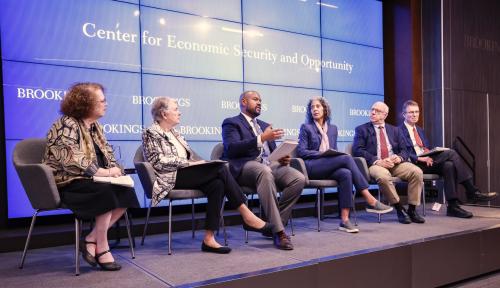In this essay from the Center on Children and Families’ Essay Series on Character and Opportunity, Lawrence Mead says that to say character depends on opportunity is probably false; it suggests that society is responsible for whether people behave well or not, rather than the individuals themselves.
In “The New Politics of Character” Richard Reeves shows that the poor must demonstrate “character” (prudence, hard work, persistence) to overcome their disadvantages and get ahead. However, he also argues that they will do so only if opportunity is available to them. Especially, they must be able to get well-paying jobs. If they cannot, we should not be surprised if they fail to get through school, work hard, or avoid crime and unwed pregnancy.
But does character depend on opportunity? I know of no evidence that supports this, and a good deal that does not. For one thing, to say that poor youth will stay out of trouble only if they can anticipate success is contrary to the psychology of youth. Most young people don’t calculate their futures like this. Would that they did! Rather, they do what their elders tell them, and if they do not they consider it a moral issue. If they succumb to imprudence, it’s because these moral constraints have failed and not because opportunity is lacking.
History suggests, if anything, that improved opportunities undercut virtue. For all our current economic problems, opportunity is still far better today for low-skilled youth than it was generations ago. Back then, most young people had to take the low-skilled, monotonous jobs that many think discourage youth from virtue today. Do not romanticize the factories. Marx didn’t. Most of those jobs were dirty and dangerous as well as low-paid. Only a few industries – autos, steel – ever paid unskilled workers well, and mostly due to unions. Yet back then, imprudent behavior was far rarer than today. Crime and unwed pregnancy were vastly lower. Since then, opportunity and prudence have changed in opposite directions.
Simply in theory, it’s not obvious why a harsher environment should produce less prudent behavior rather than more. During the Great Depression, crime fell. Why now should adversity reduce social discipline rather than increase it? Edward Shils argued in the 1960s that affluence was undercutting discipline. In a rich society, why should one postpone immediate pleasures for the future?1 Affluence is probably one reason why work and marriage are falling today. In a rich society, many assume that they can get through life even without marriage or regular work. And if this is all they seek out of life, they are probably right.
I know of no research in which low-skilled people themselves say that there’s no point in avoiding pregnancy or graduating from high school because opportunity is lacking. Rather, that is what better-off commentators believe their behavior implies.
In the ethnographic work of Elijah Anderson or Kathryn Edin, unwed mothers or nonworking men and youth almost never say that they live as they do because such a life is all they can expect. Both Anderson and Edin endorse the mismatch theory, the idea that lack of jobs in cities explains why few poor work regularly, but their own findings don’t support this. Rather, their respondents see marriage and work largely as moral issues. They assume jobs are available. They know that they can and should work. If they do not, they do not blame the society. Rather, they blame themselves or others for moral shortcomings.2 One may argue that this moral language conceals an actual lack of jobs.3 But why should we not take the respondents at their word?
The nonworking poor don’t talk like trade unionists. They don’t say that working isn’t worthwhile for lack of good jobs. They simply fail to work, or they drop out of the labor force, largely for personal reasons that they cannot defend. Nor does providing them higher wages or better jobs make much difference. Nonworkers are simply not very responsive to such payoffs. The Earned Income Tax Credit is often thought to have raised work levels among poor parents by “making work pay.” But what it really does is raise income if you work. It is seldom the reason people go to work.4 Welfare reform succeeded in raising work levels largely because it enforced work as a condition of aid. Authority, not opportunity, was what promoted virtue.
Unwed pregnancy, most would say, is even less responsive to economic payoffs than nonwork. It’s true that poor mothers refuse to marry the fathers of their children because they find them unreliable. But the fathers are not obviously unreliable due to a lack of opportunity. After all, many of the mothers work. They assume the fathers could too, and the latter seldom demur. And, in a sense, the parents aren’t refusing to marry, because they have children anyway. They thus incur most of the burdens of marriage without the benefits. Fathers split with families yet have to pay child support. How then is nonmarriage sensible behavior – whatever the opportunity structure?
If the unmarried avoided having children entirely, the case that opportunity matters would be far stronger. That’s what adults without resources did in Victorian times, when opportunity really was lacking. If they don’t do it today, the cause has to be a decline in conventional morals, not the loss of factory jobs. When parents fail to marry today, what they appear to fear most is commitment to each other, not the economy. Character mostly means a capacity to commit to difficult tasks, including marriage. That capacity – not opportunity – is what has declined.
None of this means that opportunity is unimportant. We should assure it as an act of justice. Our leadership will also demand that. But to say character depends on opportunity is probably false. It is even counterproductive. For to say this suggests that society is responsible for whether people behave well or not, rather than the individuals themselves. The undercuts the core of character, which is above all to take responsibility for oneself. Character in the end has little to do with payoffs and everything to do simply with doing the right thing.
1. Shils, Edward. “Plenitude and Scarcity: The Anatomy of an International Cultural Crisis.” Encounter (May 1969): 37-57.
2. Anderson, Elijah. Streetwise: Race, Class, and Change in an Urban Community. Chicago: University of Chicago Press, 1990; Anderson, Elijah. Code of the Street: Decency, Violence, and the Moral Life of the Inner City. New York: Norton, 1999; Edin, Kathryn, and Maria Kefalas. Promises I Can Keep: Why Poor Women Put Motherhood Before Marriage. Berkeley: University of California, 2005; Edin, Kathryn, and Timothy J. Nelson. Doing the Best I Can: Fatherhood in the Inner City. Berkeley: University of California Press, 2013.
3. Smith, Sandra Susan. Lone Pursuit: Distrust and Defensive Individualism Among the Black Poor. New York: Russell Sage, 2007.
4. Mead, Lawrence M. “Overselling the Earned Income Tax Credit.” National Affairs 21 (Fall 2014): 20-33.w




